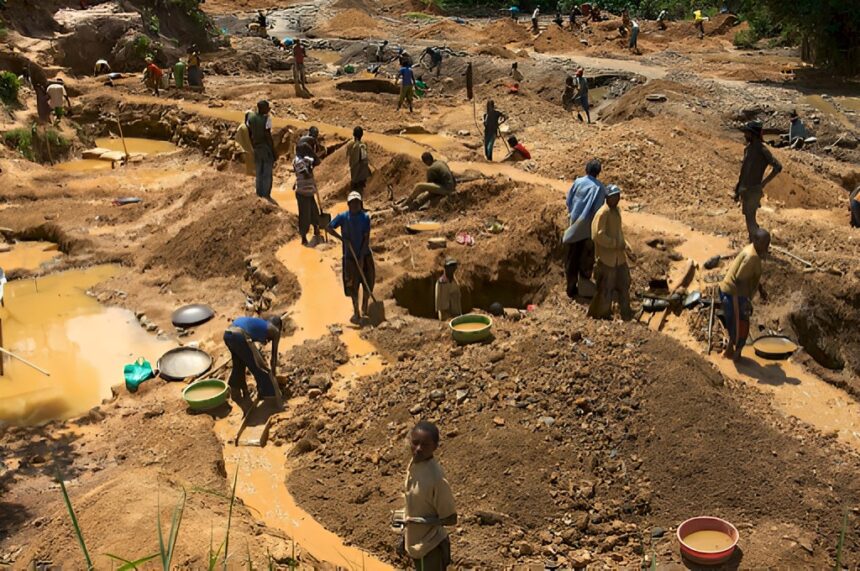A new report has raised grave concerns regarding the exploitation activities of certain Chinese and Indian mining companies operating within various communities in Ebonyi state, Southeast Nigeria.
The report by the Community Development Advocacy Foundation (CODAF) exposed the activities of foreign companies that are reaping massive profits while leaving local communities grappling with environmental ruins and health crises in Ebonyi.
The report, titled “Mining Practices in Ezillo and Ikwo Communities of Ebonyi State: An Environmental Time Bomb,” was publicly unveiled at a global briefing jointly organized by the Environmental Defenders Network (EDEN), Renevelyn Development Initiative (RDI) and Africa Just Transition Network (AJTN).
Pan-Atlantic Kompass reports that Ebonyi is rich in mineral resources such as lead, zinc, limestone, and marble.
Highlighting the challenges faced by local communities during the webinar for the launch of CODAF’s report on Mining and Community Rights, Dr Chukwudi Emeribe, a lecturer and researcher at the University of Benin, Edo, stated that investigation revealed that companies such as China Jing Zaing Company, Sheng-Long Mining Investment, Forever CHM Limited Quarry, and First Patriot Ltd allegedly bypassed critical Environmental Impact Assessments (EIA) in Ebonyi State to exploit precious metals.
According to Emeribe, the activities of the Chinese mining companies were exposed during a physical and onsite investigation in communities in the Ezillo and Ikwo areas of Ebonyi.
He said: “Environmental and Social Impact Assessment (ESIA), which must be conducted at the onset of any major project to determine their potential impacts, negative or positive, was not conducted concerning the activities of Quarry and lead mining companies in Ezillo and Ikwo communities, Ebonyi State.”
Emeribe also highlighted another significant issue regarding the practices of Chinese companies in their mining operations, emphasizing that these companies often engage in Community Development Agreements (CDAs) primarily with landowners, who are typically members of the elites while sidelining the voices and concerns of the residents who are directly affected by the mining activities.
He asserted that the CDAs designed to outline how the Chinese mining companies intend to distribute the economic and social benefits of the project to the community are skewed.
According to him, these agreements primarily serve the interests of the elite, ultimately disadvantaging the local residents rather than improving their welfare.
“Firstly, the document was raised and signed between heads of families of land owners and the miners.
“Representatives of the land who are referred to in the CDA document as immediate landlords or lessors do not represent the impacted communities or their concerns/opinions.
“Secondly, the CDA document is not backed by Acts of Parliament at both the Federal and State levels. As a result, nonfulfilment of obligations to the impacted community is inevitable,” he added.
Emeribe added that this lack of regulatory enforcement has left communities vulnerable to pollution and health risks like lead poisoning.
He also pointed out that the mining activities have resulted in significant environmental and health repercussions.
He said the activities have polluted water sources, which has, in turn, reduced agricultural yields.
Additionally, these activities have led to various health issues, including catarrh, hypertension, deafness, and persistent cough.
In his keynote address during the webinar, Barrister Chima Williams, an environmental activist and lawyer, gave insights into the legal angle surrounding Chinese mining activities in Nigeria.
Williams maintained that the public opinion that Nigerian citizens cannot sue Chinese companies over the CDAs is false.
He asked: “Do we have the right to bring an action against them? Simply the answer is yes. Let me start first by addressing you know, an issue Dr Emeribe raised, which he concluded that it is not an actionable document.
“The CDA (Community Development Agreement) is an actionable document because the community development agreement is provided for under the mining and mineral acts of Nigeria.
“It is the ignorance of our people that is being capitalized by the Chinese companies and their cohorts in government circles to undermine the rights and suppress the interest of the generality of the citizens.”
Mercia Andrews, Rural Women’s Assembly Southern Africa Director, in her address, painted a bigger picture of the activities of Chinese mining companies in Africa.
Andrews, a South African activist, said the nefarious activities of Chinese extractive industry are not peculiar to Ebonyi State or Nigeria alone, maintaining that Africans must unite to raise the stakes and fight against the illegal activities of multinational companies on the continent.
She asserted: “We can look at many other African communities where this level of mining is happening, and we’ll see a similar pattern.
“This is why I’m saying we must start by saying what we see in this report is not unique to this community. There’s an ongoing pattern of violation of our communities and an extraction of our minerals across Africa.
“Of course, I will say what all of you know this ongoing extractivism hasn’t benefited us, hasn’t benefited the poor, hasn’t benefited our communities, and we must keep asking, why not?
“I want to start a trajectory that asks the question, why is it that we see this new wave of an extractive and extensive and intense wave of extractivist across Africa for its critical minerals? Why is it?
“I think we need to answer this question so that our activism and our campaigns go from the micro, from the village level, from the local community to the national level, in our country, to our regional levels so it becomes continental, wide campaigns that we take up, that we drive because the patterns are the same.”
She continued: “I think we can pull the threads and link the dots and they will be the same.
“So why this intense extractivism? In my view, it’s very much linked to the situation or this drive around decarbonizing society, as it were, or decarbonizing Europe, because Africa hardly pollutes.
“It’s linked to this idea that we need a transition. What do we need in a transition? More electric cars, more electric busses, more electric trains, and I can go on greater levels of technology and so on, and this is part of the transition.
“And so we need to ask ourselves, where is this transition taking place? Do we in Africa have trains? We have bullet trains, electrified trains, or buses that can go up and down our streets.
“In the village where this mining is taking place, I’m sure there wasn’t even a bus that goes there, let alone an electric bus. So we must begin to see that we are in a new moment. Climate change and decarbonization are driving extractivism.”
Speaking also, a Nigerian environmental activist, who is also the Executive Director of the Renevlyn Development Initiative (RDI), Philip Jakpor, appealed to the media to give more coverage to the activities of Chinese and Indian mining companies in Nigeria.
According to him, some Chinese companies are hiding a lot about their operations across the country.
In his words: “I believe some of the information we have here requires some level of follow-up. Mining firms hide a lot. It is very important that we know that.
“This report has given us some snippets of some of the issues that we will need to follow up as journalists.
“I’ll mention a few; we have seen with this report that there are issues with waste disposal and waste management plans.
“We need to interrogate agreements with communities. We need to look at the corporate social responsibility of these Chinese and Indian firms.
“We need to probe into their books. Who are their board members?
“Some of these things are very important. Because you might be surprised that you have a lot of big people in that state among the board members (of the Chinese mining companies),” Jakpor added.





